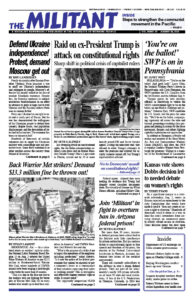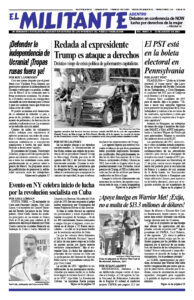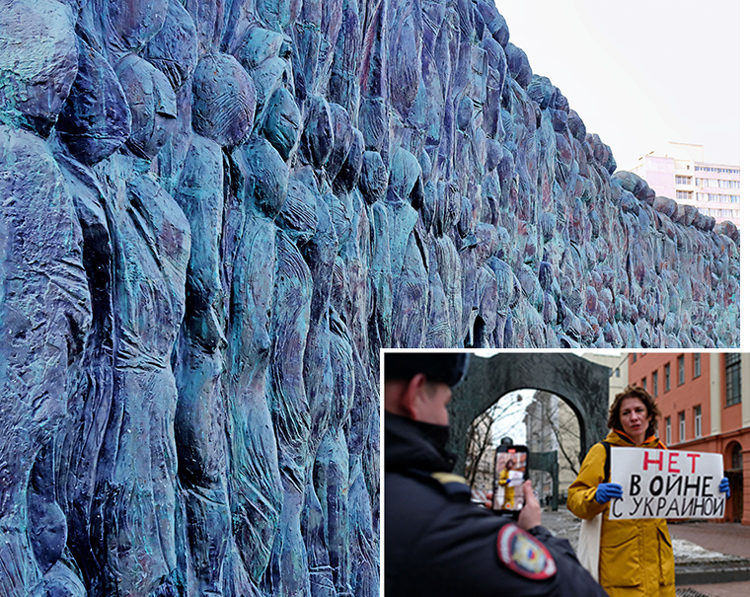Nearly six months after Russian President Vladimir Putin launched a war to snuff out Ukraine’s independence and subjugate its people, Moscow’s offensive has largely stalled in the face of resolute Ukrainian resistance. Despite this, the Kremlin continues to unleash murderous bombardments in an effort to advance its goals at huge cost to both Ukraine and the Russian soldiers Putin uses as cannon fodder.
Putin says Ukraine has no right to exist and is really part of Russia. But the war has demonstrated the willingness of the Ukrainian people to defend their country, despite losses, vast population displacement, and the devastation of cities and infrastructure. The economy has been cut almost in half.
Hundreds of thousands of civilian volunteers toil to supply the Ukrainian military with camouflage nets and protective vests. Some ferry ambulances or other supplies across the country from Poland or elsewhere.
Where Moscow’s forces have occupied Ukrainian cities, like in Kherson, and suppressed protests against their rule, they now face both a counteroffensive from Kyiv and guerrilla attacks from Ukrainians living in those towns.
The Kremlin is being forced to shift forces from Donbas in the east to reinforce its occupation in the south as Kyiv’s counteroffensive utilizes longer-range precision weapons.
Ukrainian President Volodymyr Zelensky proposed Aug. 8 that western countries shut their borders to all Russian nationals, irrespective of their stance on Moscow’s war. His proposal undercuts the building of solidarity that is needed between working people in Ukraine and Russia, to force Putin to end his war and withdraw Russian forces. Putin cynically utilizes such moves by the capitalist government in Kyiv to claim his regime is defending the Russian people against “Western aggression.”
Imperialist world order shaken
The largest ground conflict in Europe since the Second World War continues to send shock waves throughout the imperialist world order.
Capitalist powers from Germany to Japan are rearming. Alignments are being shaken as each ruling class looks to advance its own interests in a more unstable and crisis-ridden world. In Europe rifts are widening among and within the major powers.
Moscow cut oil supplies through a pipeline that supplies the Czech Republic, Hungary and Slovakia Aug. 4, aiming to sharpen rifts within the EU over sanctions. The Kremlin continues to squeeze capitalist governments in Europe by limiting gas supplies they depend on. Putin is banking on growing energy shortages to induce Washington and its allies to back off supporting Kyiv militarily and financially. The Kremlin hopes this will allow it to hold onto the territory it has seized, if not make deeper inroads.
A deal recently brokered by Turkish and U.N. officials with Moscow aims to free up over 20 million tons of Ukraine’s agricultural exports held up by the Russian naval blockade in the Black Sea to alleviate worsening world food shortages. Before the war Russia and Ukraine accounted for nearly a third of global wheat and barley exports.
By Aug. 9, 12 cargo ships carrying a quarter-million tons of grain had sailed from Ukrainian Black Sea ports. These wartime exports won’t reach the prewar level of 6 million tons a month any time soon.
Impact of war in Russia
Many among Moscow’s numerically superior armed forces are demoralized. The Kremlin has made it a crime to question Putin’s invasion. The number of war dead is a state secret to prevent mourning families and protesters from joining forces in opposition to the war. Public knowledge of casualties would impede Moscow’s urgent recruitment effort to replace losses at the front. Estimates that 15,000 Russian troops have been killed since the invasion began would equal those in the decadelong Soviet invasion of Afghanistan, which led to deep unrest at home.
Alexandra, from the Russian Baltic enclave of Kaliningrad, became a widow at 19 when her husband, Maksim, a marine, was killed in Ukraine. Her father, Sergei Dustin, posted comments online saying the Russian people needed to ask why their sons were dying. He called the war a “massacre started by crazy old men” incapable of “anything but destruction, threats against the world” and “endless lies.”
Dmitry Shkrebets is the father of a conscript sailor listed as “missing” after the Russian Black Sea flagship Moskva was sunk by Ukrainian missiles April 13. He accuses Russian authorities of covering up how many sailors died. Secret police grilled him and searched his house before the military finally issued a death certificate for his son Aug. 2.
“We will never be the same again,” Shkrebets wrote. “We have become more unhappy, but also stronger, tougher. We no longer fear even those who should be feared.”
Some Russian soldiers refusing to fight are being held in camps in Moscow-occupied areas of Ukraine, including at Popasna, Stakhanov and Krasnyi Luch. At Brianka, in the Donbas, relatives have set up a vigil to demand their sons’ release outside a camp where 200 “refuseniks” are being held.


